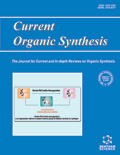
CURRENT ORGANIC SYNTHESIS
Scope & Guideline
Pioneering Research in Organic and Biochemical Synthesis
Introduction
Aims and Scopes
- Organic Synthesis Methodologies:
The journal emphasizes novel synthetic methods, including traditional techniques and emerging green chemistry approaches, to improve the efficiency and sustainability of organic synthesis. - Pharmacological Applications:
A significant focus is placed on the synthesis of bioactive compounds, especially those with potential medicinal applications, including anticancer, antimicrobial, and antiviral activities. - Heterocyclic Compounds:
Research on the synthesis and characterization of heterocycles is prevalent, reflecting their importance in drug development and materials science. - Catalysis in Organic Synthesis:
The journal covers developments in catalysis, including metal-catalyzed reactions, organocatalysis, and the use of sustainable catalysts to promote organic transformations. - Green Chemistry Practices:
There is a consistent focus on environmentally friendly synthesis processes, including the use of renewable resources, solvent-free reactions, and waste minimization.
Trending and Emerging
- Green Synthesis and Sustainable Chemistry:
There is an increasing emphasis on green chemistry practices, with a focus on sustainable synthesis methods that reduce environmental impact and enhance efficiency. - Medicinal Chemistry and Drug Development:
Research related to the synthesis of new pharmaceutical compounds, particularly those targeting cancer and infectious diseases, is on the rise, indicating a strong alignment with current health challenges. - Nanocomposite and Hybrid Material Development:
Emerging studies on the synthesis of nanocomposites and hybrid materials showcase their potential applications in drug delivery systems and tissue engineering. - Multicomponent Reactions (MCRs):
The trend towards multicomponent reactions is gaining momentum, allowing for more efficient synthesis of complex molecules in a single step. - Computational Chemistry and Modeling Studies:
There is a growing trend in incorporating computational studies and molecular modeling in synthetic chemistry, aiding in the prediction of compound behavior and optimizing synthesis.
Declining or Waning
- Traditional Organic Synthesis Techniques:
There has been a noticeable decrease in publications centered around conventional organic synthesis methods, suggesting a shift towards more innovative and eco-friendly approaches. - Non-bioactive Compound Synthesis:
Research focusing on the synthesis of compounds without clear biological applications is less frequent, indicating a growing preference for studies with direct implications in pharmacology or materials science. - Inorganic Chemistry Topics:
Themes primarily related to inorganic chemistry and its applications in organic synthesis seem to be waning, as the journal increasingly prioritizes organic and medicinal chemistry.
Similar Journals

JOURNAL OF HETEROCYCLIC CHEMISTRY
Pioneering Research in Heterocyclic ChemistryJournal of Heterocyclic Chemistry, published by Wiley, stands as a key resource in the field of organic chemistry, offering in-depth research articles and insights spanning from 1966 to 2024. With its strong Scopus ranking of #83 out of 211 in the Organic Chemistry category, placing it in the 60th percentile, the journal maintains its significance and relevance within the academic community. Although it does not currently offer open access options, it provides extensive coverage of heterocyclic compounds, which are vital to various applications in pharmaceuticals and material sciences. The journal's commitment to high-quality research is further reflected in its classification as Q3 in the 2023 quartiles for Organic Chemistry. Researchers, professionals, and students alike will find valuable contributions to the intricate studies of heterocycles, enhancing their understanding and exploration of this fascinating area of chemistry.

ORGANIC SYNTHESES
Connecting Researchers through Organic Synthesis InsightsORGANIC SYNTHESES is a prestigious journal dedicated to the field of organic chemistry, published by ORGANIC SYNTHESES INC. Since its inception in 1946, the journal has served as a vital platform for researchers, educators, and practitioners in chemistry, showcasing significant findings and methodologies that advance the discipline. Although it currently does not offer open access, it is recognized for its rigorous peer-review process and its contribution to standardizing organic synthesis methods. With an ISSN of 0078-6209 and an E-ISSN of 2333-3553, the journal's impact reflects its quality, with a current Scopus ranking placing it in the fourth quartile in both Organic Chemistry and Physical and Theoretical Chemistry. This positioning underscores its critical role in fostering knowledge and innovation within these fields. Researchers and students alike will find ORGANIC SYNTHESES an essential resource for staying informed on contemporary practices and discoveries in organic synthesis.
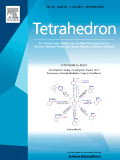
TETRAHEDRON
Catalyzing progress in biochemistry and organic chemistry.TETRAHEDRON, published by Pergamon-Elsevier Science Ltd, is a leading peer-reviewed journal that has been pivotal in advancing the fields of Biochemistry, Drug Discovery, and Organic Chemistry since its inception in 1957. With an ISSN of 0040-4020 and an E-ISSN of 1464-5416, this journal provides a platform for the dissemination of cutting-edge research and innovative methodologies that contribute significantly to the scientific community. Recognized for its rigorous editorial standards, TETRAHEDRON has been categorized in the Q3 quartile for 2023 across its relevant fields, reflecting its solid impact within the scientific sphere. Despite the current absence of Open Access options, the journal continues to engage a diverse readership, offering invaluable insights and advancements that fuel both academic and industrial applications. With an ongoing commitment to excellence, TETRAHEDRON remains an essential resource for researchers, professionals, and students aiming to stay at the forefront of chemistry and biochemistry research.

INDIAN JOURNAL OF HETEROCYCLIC CHEMISTRY
Unveiling New Horizons in Chemical InnovationINDIAN JOURNAL OF HETEROCYCLIC CHEMISTRY, published by CONNECT JOURNALS, is a vital resource in the fields of organic chemistry and biochemistry, aiming to advance research and promote innovation within the realm of heterocyclic compounds. Established in 1996, this journal has successfully converged into an influential publication with a commitment to disseminating high-quality, peer-reviewed research articles that enhance the understanding of heterocyclic chemistry applications. Although it currently holds a Q4 quartile ranking in both biochemistry and organic chemistry according to the 2023 categorizations, its broader contributions to the scientific community should not be underestimated, as it seeks to support the ongoing dialogue among researchers, professionals, and students. The journal operates from Ghaziabad, India, providing open access to its publications, thereby fostering a collaborative and informative environment for its international readership. With an ISSN of 0971-1627 and a special focus on contemporary challenges and developments in the field, the INDIAN JOURNAL OF HETEROCYCLIC CHEMISTRY is poised to make a significant impact as it continues to evolve through 2024 and beyond.
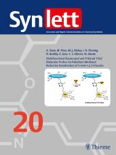
SYNLETT
Transforming Organic Chemistry Through Innovative ResearchSYNLETT is a prominent academic journal dedicated to the field of Organic Chemistry, published by GEORG THIEME VERLAG KG. Since its inception in 1989, the journal has played a critical role in advancing the understanding of synthetic methodologies and organic compounds, offering a platform for innovative research and discoveries. With an ISSN of 0936-5214 and an E-ISSN of 1437-2096, SYNLETT is well-regarded in the academic community, presently positioned in the Q3 quartile for Organic Chemistry according to the 2023 category rankings. The journal is particularly valuable for researchers and professionals seeking insights into contemporary organic synthesis methods and their applications. Although it does not operate under an Open Access model, it remains a crucial resource within the field, contributing to significant advancements and collaborations globally. For those engaged in organic synthesis, SYNLETT not only encapsulates cutting-edge research but also inspires innovation in the discipline.
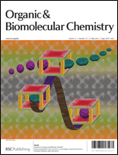
ORGANIC & BIOMOLECULAR CHEMISTRY
Unveiling the complexities of biochemistry and organic chemistry.ORGANIC & BIOMOLECULAR CHEMISTRY is a prestigious academic journal published by the Royal Society of Chemistry, dedicated to advancing the fields of organic and biomolecular chemistry. With its ISSN of 1477-0520 and E-ISSN of 1477-0539, this journal plays a pivotal role in disseminating high-quality research and contributing to the scientific community, particularly in biochemistry, organic chemistry, and physical and theoretical chemistry. Currently ranked in the third quartile for Biochemistry and the second quartile for Organic Chemistry and Physical and Theoretical Chemistry, it caters to a diverse audience of researchers, professionals, and students who seek insightful studies and reviews. With a publication history spanning since 2003 and ongoing till 2024, the journal fosters open access to its articles, encouraging the free exchange of knowledge. Situated in the vibrant academic environment of Cambridge, UK, ORGANIC & BIOMOLECULAR CHEMISTRY serves as a vital resource for innovative research at the intersection of chemical sciences.
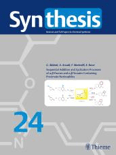
SYNTHESIS-STUTTGART
Innovating Synthetic Methodologies for a Sustainable Future.SYNTHESIS-STUTTGART
Published by the esteemed Georg Thieme Verlag KG, SYNTHESIS-STUTTGART stands as a vital resource in the field of Chemistry, specifically focusing on Organic Chemistry and Catalysis. With an impressive publication history dating back to 1970 and continuing through 2024, it serves as a platform for innovative research and developments in synthetic methodologies and their applications. The journal holds a significant impact factor, reflecting its influence within the academic community, and is recognized in the Scopus rankings as a reputable source in its categories, with a rank of #99/211 in Organic Chemistry and #43/68 in Catalysis. Researchers, professionals, and students alike can benefit greatly from its content, which upholds rigorous peer-review standards and contributes to the global discourse in these critical scientific domains.

BIOORGANIC & MEDICINAL CHEMISTRY LETTERS
Innovating drug discovery through biochemistry insights.BIOORGANIC & MEDICINAL CHEMISTRY LETTERS, published by PERGAMON-ELSEVIER SCIENCE LTD, is a leading journal in the fields of biochemistry, drug discovery, and medicinal chemistry, designed to disseminate significant advances in these disciplines. Established in 1991, the journal spans various important categories, including Organic Chemistry and Pharmaceutical Science, with its 2023 Scimago Journal Rank placing it at Q2 in Organic Chemistry and Q3 in several other relevant fields. Though not an open-access publication, it provides invaluable insights into contemporary research and innovative methodologies, appealing to researchers, professionals, and students alike. The journal's commitment to quality and relevance makes it a vital resource for those aiming to stay at the forefront of bioorganic and medicinal chemistry developments. For more information, please visit the journal's website as it remains a critical platform for scholarly exchange, particularly for those engaged in interdisciplinary research.
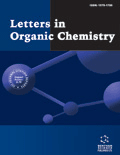
LETTERS IN ORGANIC CHEMISTRY
Fostering Dialogue for Future InnovationsLETTERS IN ORGANIC CHEMISTRY is a distinguished journal published by Bentham Science Publishers Ltd, focusing on the rapidly evolving field of organic chemistry. Established in 2005, the journal commits itself to disseminating vital research findings, reviews, and innovative methodologies that contribute to the understanding and advancement of organic chemistry and biochemistry. With an ISSN of 1570-1786 and an E-ISSN of 1875-6255, this journal enhances accessibility and visibility for authors and readers alike, albeit not adopting an open-access model. Positioned within Q4 quartile rankings for both Biochemistry and Organic Chemistry, it serves a niche audience keen on exploring emerging trends and breakthroughs in these disciplines. Its Scopus rankings further reflect its role in the global academic landscape, albeit at the beginning stages of its impact journey. Based in the United Arab Emirates, LETTERS IN ORGANIC CHEMISTRY is dedicated to fostering dialogue among researchers and practitioners, paving the way for future innovations in organic and biochemical sciences.
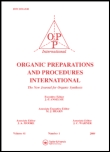
ORGANIC PREPARATIONS AND PROCEDURES INTERNATIONAL
Exploring the Depths of Organic Chemistry for All LevelsORGANIC PREPARATIONS AND PROCEDURES INTERNATIONAL is a prominent journal in the field of organic chemistry, published by Taylor & Francis Inc. With an ISSN of 0030-4948 and an E-ISSN of 1945-5453, this journal has been a vital resource for researchers since its inception in 1971, showcasing a broad range of methodologies, protocols, and innovative applications within organic synthesis. Although categorized in the Q4 quartile for organic chemistry, the journal provides a critical platform for researchers at all levels to disseminate their findings and to access a wealth of practical organic procedures. It currently ranks #151 out of 211 in the Scopus Organic Chemistry category, underscoring its role in advancing the discipline despite its relatively modest impact factor. The journal offers a diverse collection of scholarly articles that are essential for both professional chemists and students, enriching their understanding of organic preparation techniques. Inviting contributions that encompass the full spectrum of organic synthesis, this journal serves as a valuable conduit for knowledge exchange in the ever-evolving field of organic chemistry.